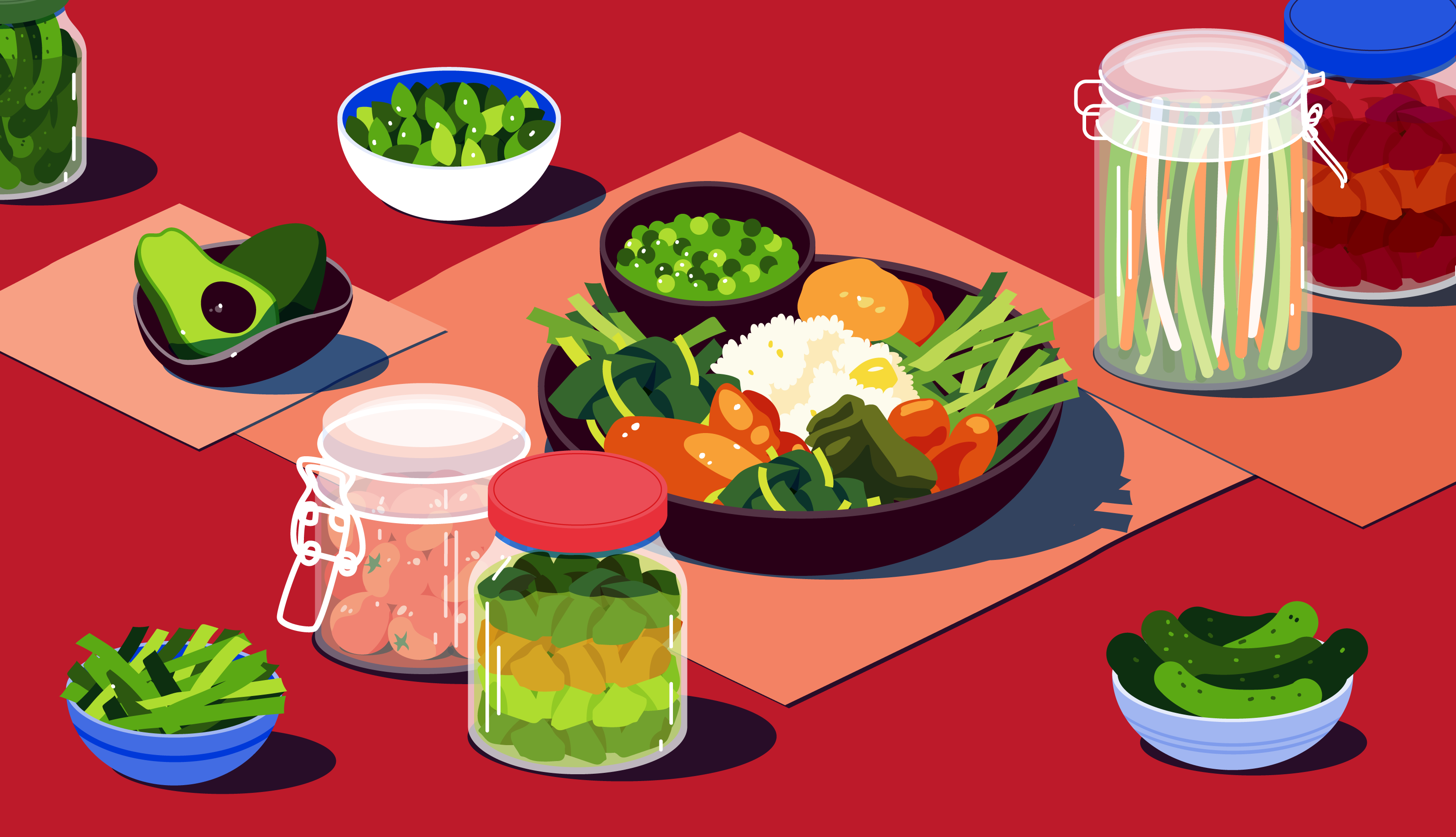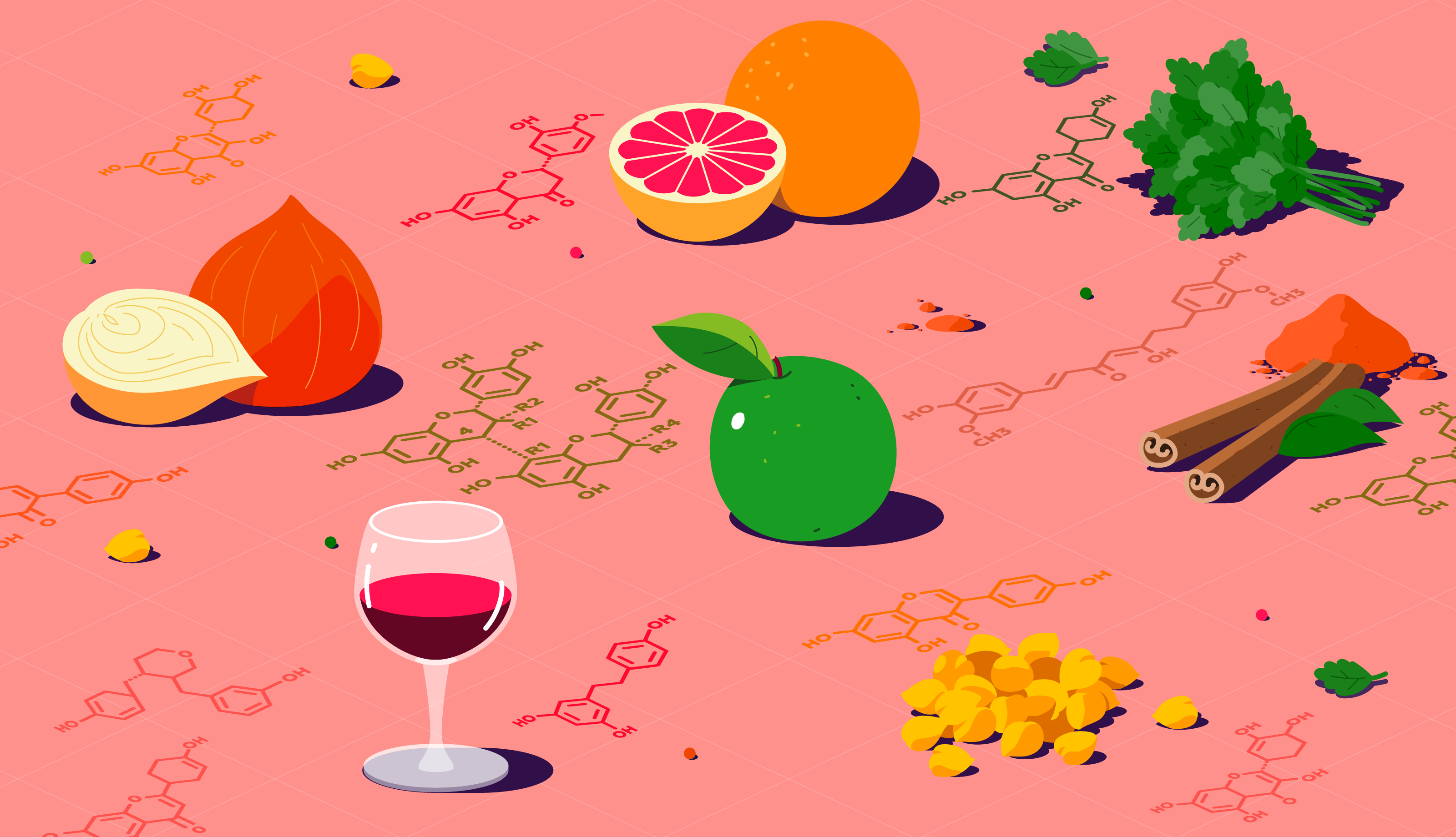Can fermented food and fermented products heal anything? We explain the facts for health and how fermentation works.
Fermentation is a traditional food preservation technique that provided humans with food before the invention of mod-cons like fridges and freezers. Because fermentation is only possible thanks to probiotic bacteria, scientists believe these foods have potential benefits for health.
Probiotics are live bacteria with proven benefits for the gut, metabolism, and possibly even mental health. Fermented foods create a neat delivery method to your gut where they can influence your health. Here, we look at the evidence on fermented foods for health and what foods to eat.
Table of contents
- Fermented products: how bacteria changed food
- List of popular fermented foods and beverages
- Fermented food benefits for the gut and body
- Science on probiotic food benefits is limited
- The final word: is fermented food good for you?
Fermented products: how bacteria transformed food
Humans have been fermenting since the dawn of time, and alcohol is a prime example of our obsession with the bacterial transformation of food.
The process of fermentation happens when bacteria (and yeasts) break down and transform a substance into something else. In terms of food, the activity of the microbes confers food and beverages a distinctive, texture, and flavour, as well as an enhanced nutritional profile.
Our love affair with fermented products (and booze) is ancient. For example, alcohol was a very early fermented food product. In fact, humans enjoyed it so much that some theories suggest our thirst for beer actually instigated the domestication and farming of grains.

A 2018 study suggests that alcohol brewing started 13,000 years ago and motivated the development of agriculture. Others hypothesise that a genetic mutation found in our last common ancestor allowed them to metabolise the alcohol in fermented fruits scavenged from the forest floor.
Whether you're a teetotaler or not, fermented foods are a staple part of the diet in many cultures. They are easy to produce and only require a handful of ingredients, so anyone can have a go at fermenting their own – that's probably why our ancestors adopted this technique.
Whether you're trying to choose fermented foods good for you, or just looking for popular fermented foods to enhance your diet, check out our fermented food list with 12 fermented products, some of which are pretty obscure.
Popular fermented foods and beverages
| Food | Fun facts about fermented foods | |
|---|---|---|
| Probiotic yoghurt | This well-known probiotic food contains lactic acid bacteria and bifidobacteria, but not all yoghurt is probiotic, so choose natural yoghurt with live or active cultures. | |
| Kefir | There are two types of kefir. Milk kefir is a creamy, sour fermented dairy beverage, but lactose-free water kefir is made from sugar and water with water kefir grains | |
| Chocolate | The bars of chocolate you buy from the shop don’t contain probiotics. However, making chocolate requires the fermentation, drying, and roasting of cacao beans. | |
| Natto | This traditional and pungent Japanese dish is made from fermented soybeans and contains vitamin K and fibre. Some even call it the "Japanese marmite". | |
| Miso | This paste is another Japanese variation of fermented soybeans. Miso soup is often a breakfast food because it's believed to stimulate digestion and give energy | |
| Tempeh | In Indonesia, soybeans are fermented in tempeh, a meat substitute. During fermentation, bacteria break down indigestible phytic acid, making the beans easier to digest. | |
| Apple cider vinegar | Some studies suggest that it could improve insulin sensitivity. The acetic acid produced by the fermentation bacteria makes the vinegar safe to consume in moderation. | |
| Kimchi | A popular Korean dish made from fermented cabbage, salt, and strong spices - kimchi is spicy and may help lower blood sugar and cholesterol levels for metabolic health. | |
| Olives | It’s not possible for humans to eat olives unless they sit in a salt brine that provides the microbial environment for bacteria to remove bitter tasting phenolic compounds. | |
| Sauerkraut | This traditional central European cabbage dish fermented by lactobacilli is made by pummeling cabbage with salt and letting it sit in the juices for two weeks or so. | |
| Sourdough bread | This bread is made using a sourdough starter containing wild yeasts and bacteria. The bread is more digestible, but baking kills off the probiotic microbes inside. | |
| Kombucha | Made from tea, sugar, and a SCOBY (symbiotic culture of bacteria and yeasts), the microorganisms in kombucha transform the sugar into alcohol, vitamins, and acetic acid. |
☝️FACT☝️Pasteurised fermented foods no longer contain live probiotic microbes, but they still have the nutrients produced during fermentation.
Fermented food benefits
Why is fermented food good for you? Well, it contains beneficial bacterial communities that prevent spoilage and boost nutritional value.
The benefits of fermentation hinge upon microbial activities that preserve food, meaning less spoilage and a longer shelf-life, that also give food a unique and distinctive taste. This process is why the nutritional value of fermented foods and their digestibility are better.
Why are fermented foods good for you?
Microbes can also metabolise polyphenols, natural antioxidants in plants, which increases the level of these important substances. For example, black and green tea contain health-promoting polyphenols - when they're made into kombucha, the polyphenol content is boosted too.
Are there fermented vegetables benefits?
Practically any vegetable can be fermented, from asparagus tips to carrots and even potatoes - an ancient Slavic food that is particularly pungent. Even though they are often called "pickled vegetables", when transformed with bacteria, they are actually lactofermented (with lactic acid bacteria).
Lactofermented vegetables are better than pickled vegetables, which are just preserved in vinegar, because microbes produce vitamins and boost the availability of minerals by metabolising the natural sugars in the plants.
Fermented vegetables health benefits are not limited to just nutrients, they also contain dietary fiber which is good for the gut. Prebiotic dietary fibers nourish beneficial bacteria in the microbiome while other fibers stay intact and help with the frequency of bowel movements.
Microbes in fermented foods
Lactic acid bacteria are the most common and well-known fermentation bacteria. They can live in salty environments that are uninhabitable for opportunistic (and potentially harmful bacteria), which is why salt brines are common in fermentation.

These bacteria also produce nutrients and acetic acid (the basis of vinegar) that transform the pH of the food, making it acidic (which also acts as a deterrent to bad microbes). That's why fermented foods tend to be sour.
Bifidobacteria are also recognised probiotic bacteria that help ferment foods. They are particularly prominent in fermented dairy, like yoghurt, which often contains Streptococcus thermophilus - but this type of streptococcus is not dangerous for your health.
Health benefits of fermented foods
The probiotic bacteria found in fermented foods can also be found in the gut where they share health benefits with you, the host. These live microorganisms do some magical things for your gut, keeping the environment balanced by producing health-promoting metabolites.
Health benefits of probiotic bacteria
- production of vitamins, short-chain fatty acids, and organic acids
- combatting invaders with acidic pH and antimicrobial compounds
- preventing diarrhoea and digestive upsets
- restoring microbiome balance after antibiotics
- potential benefits for stress resilience and mental health
Fermented foods for microbiome health
Fermented foods are a neat way to deliver health-promoting bacteria to the gut. Even when the health benefits of fermented foods have a transient effect, regular consumption can have a positive effect on the diversity and composition of the gut microbiota.
Diversity is key. If it’s low and you have too much of one type of bacteria and not enough of another, you’re at risk of an unbalanced gut microbiome, also known as dysbiosis. Consuming beneficial microbes helps maintain the correct acidity so other good microbes can prosper, but opportunists don't.
☝️TIP☝️ Discover your microbiome levels of beneficial bacteria and probiotics with the Atlas Microbiome Test.
Fermented foods gut health 101
Probiotic bacteria can improve the gut barrier function and strengthen intestinal permeability. That’s because they produce a short-chain fatty acid, acetate, that is used by other beneficial bacteria to make butyrate - another SCFA that fuels the cells of the gut lining, preventing "leaky gut".
Makes milk easier to digest
Some adults have lactose intolerance, meaning their body produces much less lactase, the enzyme that breaks down the lactose (a sugar) in dairy products, resulting in digestive symptoms like bloating, flatulence, pain, and diarrhoea.
That's because bacterial fermentation can make dairy products digestible for mild lactose intolerance by breaking down lactose: when there's less lactose, people with mild lactose intolerance can handle it better.
Furthermore, L. acidophilus, a microbe in probiotic yoghurts, aids the digestion of lactose because it actually produces lactase, the essential enzyme needed to break down milk sugars.
Improves heart health
Some research shows that certain lactic acid bacteria, like L. helveticus, can reduce blood pressure in people who have a mildly high blood pressure reading. That’s because it breaks down complex proteins in foods like milk, releasing compounds known to lower blood pressure.

That’s not all, L. acidophilus has been shown to lower blood cholesterol levels, which are also associated with heart health. Collectively, these benefits could help prevent heart disease and improve the overall health.
Boosts immune system
Fermentation health benefits support beneficial bacteria in your colon that strengthen and improve immune system function. Bifidobacterium bifidum and L. acidophilus directly prevent pathogens from causing illness, while others train your immune system to recognise good and bad bacteria.
Milk kefir is among one of the best researched fermented foods and could help boost the immune system function. It has antimicrobial properties, and studies indicate that it could prevent some gastrointestinal infections caused by bacteria, including salmonella.
Brain and cognitive function
The probiotics in food may have a positive effect on your gut microbiota, which in turn has benefits for your brain. Your brain and gut communicate constantly via the nervous system, and bacteria produce metabolites that may strengthen stress resilience and tackle anxiety and depression.
Limited research and side effects
Research surrounding the benefits of fermented foods is limited because microbes have been reviled since the discovery of infectious bacteria by Pasteur. Back then, humans didn't have the tools we have now though, like DNA sequencing, that allows scientists to finally investigate the benefits.
Even though research into probiotics is booming, scientists only recently became interested in the possible benefits of fermented foods for health. After all, they're cheap (compared to medicine) and populations who consume a variety of them tend to be healthier.
So while there is a link between fermented foods and health via the beneficial action of microbes, further research is needed to elucidate what features of our health can benefit from fermented food and how these mechanisms actually work.
Not all fermented foods are probiotic
Probiotic bacteria are present in many fermented foods. They transform the complex carbohydrates, proteins, and fats which changes the bioactivity and nutrition of the food in a way that benefits your health.
However, not all fermented foods are probiotic. For example, high cooking temperatures or pasteurisation kill the microorganisms, and beverages like beer have the culture removed before they are sold to you. But, foods like yoghurt can be both fermented and a probiotic.
☝FACT☝Fermented foods and probiotics are not the same thing. Fermented foods can contain probiotics, but not all do.
Salt and indigestion
As discussed, the fermentation process typically requires salt - in large amounts - because it makes the environment inhabitable for bad bacteria and cleanses any that could be on the vegetables, surfaces or in the water. However, high salt intake is associated with bloating and should be limited for people with heart problems.
Also, some people may find that eating large amounts of fermented foods can cause side effects like gas and bloating, especially if you don't introduce them gently into your diet. In essence, fermented foods that are good for you should be consumed in moderation.
Recently, researchers also pinpointed a possible association between consuming fermented food and gastric cancer. A 2012 review shows that intake of pickled veg and foods may increase the risk of gastric cancer in Koreans and Chinese nationals.
So, are fermented foods good for you?
The process of fermentation has been around for thousands of years and is still a staple in many cultures across the world. The research into the benefits of probiotic fermented food is growing, particularly as its popularity increases.
The health benefits of fermented foods are possible because the bacteria make them safe and enhance their nutritional profile. Lactic acid bacteria and Bifidobacteria make the environment unwelcoming for opportunistic pathogens while also making beneficial metabolites.
So why eat fermented foods? Although there is still lots to be learned about the benefits of fermentation, fermented foods can be incorporated into a balanced, healthy diet because the probiotics they contain are known to have a variety of health benefits, particularly for the gut.
- Bourrie, B, C, T et al. The Microbiota and Health Promoting Characteristics of the Fermented Beverage Kefir, 2016
- Curry, A. Our 9,000-Year Love Affair with Booze, 2017
- Dimdi, E et al. Fermented Foods: Definitions and Characteristics, Impact on the Gut Microbiota and Effects on Gastrointestinal Health and Disease, 2019
- Hasan, M, N et al. Significance of Fermented Food in Nutrition and Food Science, 2014
- Liu, L et al. Fermented Beverage and Food Storage in 13,000 y-old Stone Mortars at Raqefet Cave, Israel: Investigating Natufian Ritual Feasting, 2018
- Marco, M, L et al. Health Benefits of Fermented Foods: Microbiota and Beyond, 2017
- Martínez Leal, J et al. A Review on Health Benefits of Kombucha Nutritional Compounds and Metabolites, 2017
- Panesar, P, S. Fermented Dairy Products: Starter Cultures and Potential Nutritional Benefits, 2011
- Ray, R, C and Joshi, V, K. Fermented Foods: Past, Present and Future, 2014
- Ren, J, S et al. Pickled Food and Risk of Gastric Cancer-A Systematic Review and Meta-Analysis of English and Chinese Literature, 2012
- Rezac, S et al. Fermented Foods as a Dietary Source of Live Organisms, 2018
- Rosa, D, D et al. Milk Kefir: Nutritional, Microbiological and Health Benefits, 2017
- Song, M et al. Effect of Lactobacillus acidophilus NS1 on Plasma Cholesterol Levels in Diet-Induced Obese Mice, 2015
- Upadrasta, A and Madempudi, R, S. Probiotics and Blood Pressure: Current Insights, 2016




















